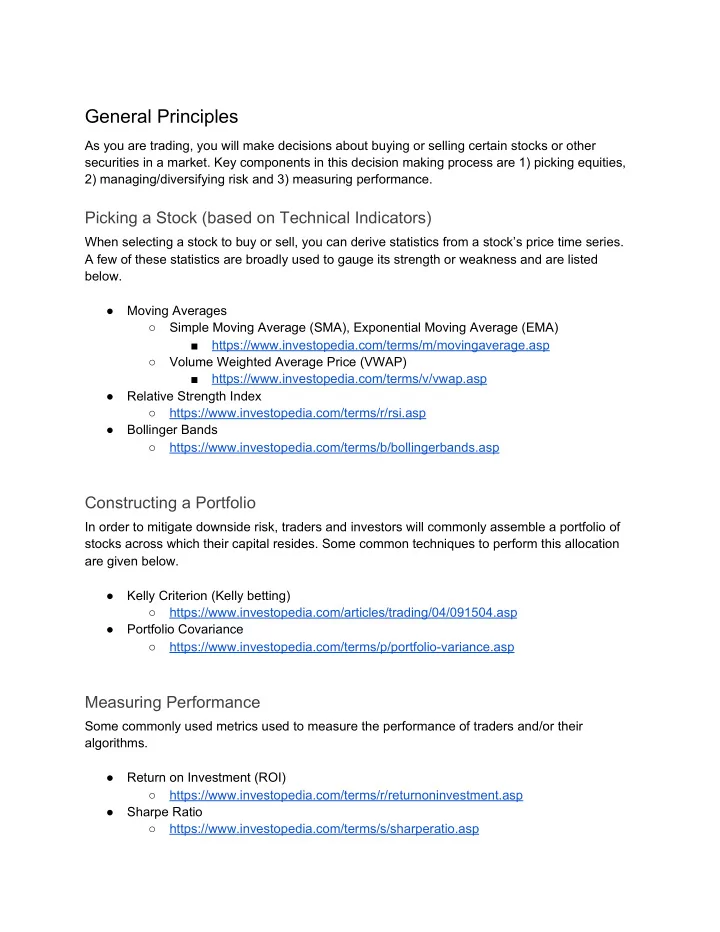

General Principles As you are trading, you will make decisions about buying or selling certain stocks or other securities in a market. Key components in this decision making process are 1) picking equities, 2) managing/diversifying risk and 3) measuring performance. Picking a Stock (based on Technical Indicators) When selecting a stock to buy or sell, you can derive statistics from a stock’s price time series. A few of these statistics are broadly used to gauge its strength or weakness and are listed below. ● Moving Averages ○ Simple Moving Average (SMA), Exponential Moving Average (EMA) ■ https://www.investopedia.com/terms/m/movingaverage.asp ○ Volume Weighted Average Price (VWAP) ■ https://www.investopedia.com/terms/v/vwap.asp ● Relative Strength Index ○ https://www.investopedia.com/terms/r/rsi.asp ● Bollinger Bands ○ https://www.investopedia.com/terms/b/bollingerbands.asp Constructing a Portfolio In order to mitigate downside risk, traders and investors will commonly assemble a portfolio of stocks across which their capital resides. Some common techniques to perform this allocation are given below. ● Kelly Criterion (Kelly betting) ○ https://www.investopedia.com/articles/trading/04/091504.asp ● Portfolio Covariance ○ https://www.investopedia.com/terms/p/portfolio-variance.asp Measuring Performance Some commonly used metrics used to measure the performance of traders and/or their algorithms. ● Return on Investment (ROI) ○ https://www.investopedia.com/terms/r/returnoninvestment.asp ● Sharpe Ratio ○ https://www.investopedia.com/terms/s/sharperatio.asp
Algorithms There are many trading algorithms that you can design, develop, and test. Below are two algorithms, mean reversion and momentum, which have been shown to work well empirically. Since these algorithms have this property, they have become common both for practical application and theoretical analysis. There are many variations to how these algorithms are implemented but below we have provided one example application of each algorithm. During the course, we will walk through the basics of these two algorithms during lectures and provide an implementation to you for the trading competition. Mean Reversion ● Trading Strategy: ○ Risk control of mean-reversion time in statistical arbitrage ■ http://math.stanford.edu/~papanico/pubftp/RDA_manuscript.pdf ● Section 3.1 on “Trading signals” ● Selected Empirical Evidence: ○ Mean Reversion in Stock Prices: Evidence and Implications ■ https://www.nber.org/papers/w2343 ○ Mean reversion in real exchange rates ■ https://citeseerx.ist.psu.edu/viewdoc/download?doi=10.1.1.392.6969&rep =rep1&type=pdf Momentum ● Trading Strategy: ○ Returns to Buying Winners and Selling Losers: Implications for Stock Market Efficiency ■ http://www.business.unr.edu/faculty/liuc/files/BADM742/Jegadeesh_Titma n_1993.pdf ● Section 1 on “Trading Strategies” ● Section 3a on “Sources of Relative Strength Profits” ● Selected Empirical Evidence: ○ Fact, Fiction, and Momentum Investing ■ https://www.aqr.com/Insights/Research/Journal-Article/Fact-Fiction-and-M omentum-Investing ○ Returns to Buying Winners and Selling Losers: Implications for Stock Market Efficiency (Same paper as above. Sections 5, 6, 7 provide empirical analysis) ■ http://www.business.unr.edu/faculty/liuc/files/BADM742/Jegadeesh_Titma n_1993.pdf
Related Courses ● Machine Learning for Trading, Georgia Tech ○ Course Website: http://lucylabs.gatech.edu/ml4t/ ○ Lecture Notes: https://docs.google.com/document/d/1BpDrMJDqx3sGt5-hoSTF3hJZVOf04hO_8 ERdLHWP5A0/edit# ○ (Most) Relevant Lectures: 01-07, 02-01 to 02-10 ● Investments, MIT ○ Course Website: https://ocw.mit.edu/courses/sloan-school-of-management/15-433-investments-sp ring-2003/ ○ Lecture Notes: https://ocw.mit.edu/courses/sloan-school-of-management/15-433-investments-sp ring-2003/lecture-notes/ ○ (Most) Relevant Lectures: 3, 8, 9, 20, 22 Academic Research Conference Workshops ● NeurIPS 2019 Workshop on Robust AI in Financial Services ○ Paper Downloads: https://drive.google.com/drive/folders/1_gVGaVLIyP1JPsfgHfMZBA_6P_UH8i08 ● NIPS 2018 Workshop - Challenges and Opportunities for AI in Financial Services ○ Paper Downloads: https://drive.google.com/drive/folders/1mvoqr8IbOYPR7sdJtFHAC2gZ-9qF6XIr ● ICML 2019 Workshop on AI in Finance: Applications and Infrastructure for Multi-Agent Learning ○ Invited Talks: https://icml.cc/Conferences/2019/ScheduleMultitrack?event=3506 Selected Papers (subject to additions) ● On the Profitability of Optimal Mean Reversion Trading Strategies ○ https://arxiv.org/pdf/1602.05858.pdf ● Enhancing Trading Strategies with Order Book Signals ○ https://ora.ox.ac.uk/objects/uuid:006addde-3a03-4d75-89c1-04b59026e1c0/dow nload_file?file_format=pdf&safe_filename=Imbalance_AMF_resubmit.pdf&type_o f_work=Journal+article
Recommend
More recommend